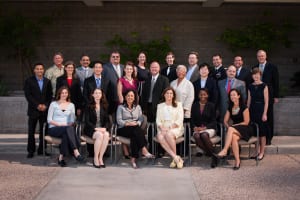 Throughout the celebrations marking Arizona’s Centennial, many have wondered about how the next generation of civic leaders can prepare for the future. The third class of Flinn-Brown Civic Leadership Fellows has been busy thinking about that same thing and planning their leadership contributions to Arizona’s next century.
Throughout the celebrations marking Arizona’s Centennial, many have wondered about how the next generation of civic leaders can prepare for the future. The third class of Flinn-Brown Civic Leadership Fellows has been busy thinking about that same thing and planning their leadership contributions to Arizona’s next century.
This group of 24 Arizonans from Safford to Flagstaff is committed to helping address the state’s long-term issues and improving the quality of life for future Arizonans. They recently completed an intensive seminar series, the first component of the Flinn-Brown Civic Leadership Academy. The Fellows devoted hundreds of hours to learning about policy topics ranging from such issues as the state’s fiscal system to the economy, human services, border issues, and water.
These Arizonans represent a wide range of outlooks, career paths, and urban and rural regions. Among them are leaders in business, education, and health policy, nonprofit executives, local elected officials, policy professionals, attorneys, an army ranger, and an Emmy-winner.
“Like each of our classes so far, this one has terrific people from throughout Arizona from all walks of life and all kinds of perspectives,” said Nancy Welch, vice president of the Arizona Center for Civic Leadership, which administers the Flinn-Brown Academy. “I know they will make a difference in Arizona.”
While their experiences and views vary, all of the Fellows have shown a strong commitment to serving their communities at the state level and to acquiring the policy and civic leadership skills needed to make a difference.
“In this cohort we have people on the left, people in the center, and people on the right,” said Fellow Russ Yelton, president and chief executive officer of the Flagstaff-based Northern Arizona Center for Entrepreneurship and Technology. “At the end of every day we dedicated time to sit down and rehash the issues to really try to come to a center conclusion.”
Each daylong seminar included detailed presentations and question-and-answer sessions with state agency heads, veteran lawmakers, business and nonprofit leaders, and policy experts.
“The speakers and presenters bring a terrific range of experience to the Fellows,” said Welch. “Each Academy becomes broader, richer, and deeper as we work through complex issues. Fellows see and discuss the opportunities for solving state-level issues.”
The assistance and commitment of the speakers extends far beyond the seminar, according to Dr. Deborah Gonzalez, a Fellow who serves as chief academic officer of the Arizona State University Preparatory Academy in Phoenix. “The program presenters have made themselves available outside of the Academy. They’ve been more than gracious in reaching out to help and mentor us informally,” said Gonzalez.
As part of the seminar, Fellows also participated in a policymaking exercise. They worked in committees that focused on a tough issue facing Arizona today, such as math readiness for high school, the state’s fiscal system, or road infrastructure and funding. The committees studied the issues and collaborated to create policy recommendations. They presented their findings to high-level civic leaders at the final Academy seminar.
The seminar series is only one element of the multifaceted civic leadership program. Fellows continue to receive guidance and support from an advisor who is an experienced state-level civic leader. “I’m hoping that my advisor will help me think through the logistics of beginning a grassroots effort that has legs,” said Gonzalez, who hopes to implement a community effort that will better support parents and impact the larger communities surrounding schools.
Britann O’Brien, director of the Southern Arizona office of Governor Brewer, is passionate about rural Arizona and the challenges and opportunities presented in border communities. As a Flinn-Brown Fellow, she found the collaboration among civically engaged peers from a range of backgrounds invaluable. “Meeting other future leaders from a huge cross section of people from all over the state has resulted in relationships that I know will continue far into the future,” said O’Brien.
The Flinn-Brown Leadership Academy is geared toward Arizonans who want to be state-level civic leaders as elected officials, members of boards and commissions, policy advisors, or state agency executives. It is one of three core components of the Arizona Center for Civic Leadership, created in 2010 by the Flinn Foundation and co-sponsored by the Thomas R. Brown Foundations, respectively based in Phoenix and Tucson, Ariz. The Center is administered by the Flinn Foundation under the guidance of the Center’s Leadership Council.
Other components of the Center include the Arizona Civic Leadership Collaborative, established to leverage and expand the efforts of local civic-leadership programs throughout the state, and a Communication and Outreach program designed to inform organizations and individuals about the importance of civic leadership and increase civic engagement among Arizonans.
The fourth Flinn-Brown Civic Leadership Academy will be held in the fall, beginning in September. The selection process, which began with submission of formal application portfolios, is now underway.
About the Flinn Foundation: The Flinn Foundation is a Phoenix-based, private, nonprofit philanthropic endowment. It was established by Dr. and Mrs. Robert S. Flinn in 1965 with the mission of improving the quality of life in Arizona. The nonprofit philanthropy supports the advancement of Arizona’s bioscience sector, the Flinn Scholars Program, the arts, and the Arizona Center for Civic Leadership.
About the Thomas R. Brown Foundations: The Thomas R. Brown Foundations are dedicated to raising the quality of life for present and future generations through expanded understanding and application of economic principles in private and public decision making. The Foundations are also dedicated to advancing solutions to community problems through strategic grants, research, and policy analysis.